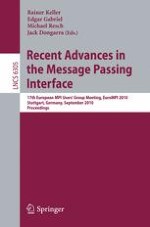2010 | Buch
Recent Advances in the Message Passing Interface
17th European MPI Users’ Group Meeting, EuroMPI 2010, Stuttgart, Germany, September 12-15, 2010. Proceedings
herausgegeben von: Rainer Keller, Edgar Gabriel, Michael Resch, Jack Dongarra
Verlag: Springer Berlin Heidelberg
Buchreihe : Lecture Notes in Computer Science
